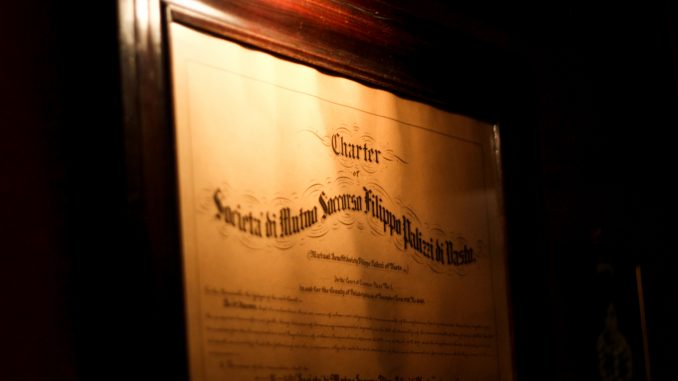
When Bon Appétit magazine ranked the Palizzi Social Club as the fourth best new restaurant in America, Owner Joey Baldino was honored.
But he doesn’t want people tweeting about it.
“I feel like what happens here should stay here, almost,” said the chef and 2001 entrepreneurship alumnus.
The Palizzi Social Club has a list of house rules, one of which prohibits excessive cell phone use. The intention, Baldino said, is to preserve the club’s legacy as a spot for socializing in person.
“Before there was social media, there were social clubs,” he said.
At first glance, the Palizzi Social Club blends almost seamlessly into its narrow corridor of South Philadelphia row homes. A softly lit sign whispers to visitors that the building at 1408 S. 12th St. is a mixture of a restaurant and bar.
After purchasing a membership — $20 a year — outsiders become guests, gaining access to a menu brimming with Southern Italian foods like escarole, stromboli and spaghetti with crabs.
Baldino has studied with renowned chefs, like Georges Perrier and Marc Vetri — but the cooking at Palizzi comes from the pots and pans of his mother, grandmother and aunts.
“It’s food that I don’t want to let die,” Baldino said.
For years, he was surrounded by Italian culinary traditions, growing up on home-made dishes like calamari and peas. It wasn’t until his time at Temple that he realized he wanted to cook the cuisine professionally.
A summer spent in Italy helped kick start Baldino’s career as a chef. While studying at Temple’s Rome campus — and sampling delicacies like wild boar for the first time — he began to consider culinary school.
“I feel like going to those little trattorias in Rome really solidified that,” said Baldino, noting his trip to the small eateries that line the streets of Italy.
After graduating in 2001, he studied at the International Culinary Institute in New York City. A decade after leaving Temple, he established Zeppoli, a Sicilian restaurant in Collingswood, New Jersey.
“A restaurant is a tough one to start up and grow,” said Monica Zimmerman, an entrepreneurship professor who taught Baldino at Temple.
Still, Zimmerman said she wasn’t surprised to hear about Baldino’s success. At Temple, her students were required to intern at a startup company. Baldino, she said, was determined to work at Vetri, a nationally ranked restaurant near 13th and Spruce streets.
Baldino would end up working there for 10 years.
“He was very open-minded, very motivated and had that special quality that you recognize as a professor that the student is going to be successful,” she said.
Baldino inherited the Palizzi Social Club from his uncle in 2016, but his family has owned the cultural and culinary hub since the 1950s. It was originally established in 1918 as a safeguard for Italian Americans who lacked insurance and financial security.
Baldino pointed to a faded, black-and-white picture on his wall. In orderly rows, the founding members gaze into a camera lens — providing a testament to the club’s early years.
“Every day, I look at that photo,” he said. “They came here for a better life for their future generations and I’m a testament to that.”
Originally, the club only allowed members from Vasto, Abruzzo — a hill town that hugs Italy’s Adriatic coast.
Eventually, it expanded to include anyone of Italian descent. Its presence wove itself into Baldino’s South Philadelphia childhood. The dimly lit, portrait-lined room served as a meeting spot after funerals, baptisms and first holy communions.
“This is a place that you would kind of come for both happy and sad times,” Baldino said.
As time passed, Baldino’s uncle asked him to take over. Owning the social club hadn’t been a thought in his mind, but he didn’t want to let the place die, he said.
“When I walked into it, I had such an overwhelming feeling of history and obligation, almost, to my heritage, to continue it,” Baldino said. “Cause if I didn’t, they would have just made an apartment building.”
Altering the club’s original charter, he opened the space to all ethnicities.
“I want it to be like a big party, you know?” he said.
The space exudes Italian-American culture. A cornicello, a horn-shaped Italian charm used to ward off evil, hangs by the cash register. Bottles of Amaro and Sambuca — fragrant Italian liqueurs — line the shelves behind the bar. Sean Reilly, a singer who impersonates Frank Sinatra, drives up from Delaware to perform on Thursday nights.
For Baldino, it feels like a moment stuck in time, he said.
“I want everybody to experience the food that I grew up with, the neighborhood I grew up in, what it means to be an Italian American, what it means to be a Philadelphian,” Baldino said.


Be the first to comment